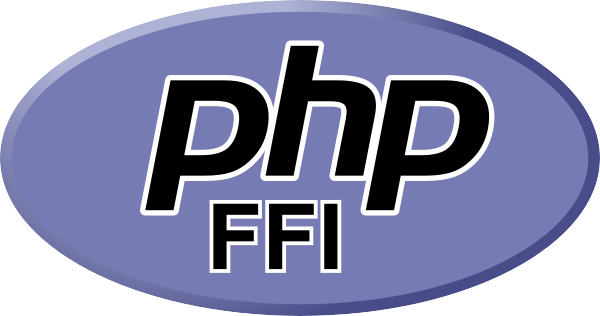
Understanding PHP FFI: A Practical Introduction
Foreign Function Interface (FFI) lets PHP call C functions and read/write C data structures directly from userland. Instead of waiting for a PHP extension to be compiled and installed, you can bind to an existing shared library (.so, .dylib, .dll) at runtime and use it immediately.
This unlocks three big wins:
- Performance & capability -- tap into well‑optimized native code.
- Access to system APIs -- read OS metrics, call low‑level utilities, or use specialized math/crypto routines.
- Rapid prototyping -- try a library before investing in a full PHP extension.
⚠️ Safety: FFI can crash the PHP process if you misdeclare a function or misuse pointers. Use it thoughtfully in CLI tools and background workers first; restrict or disable in shared web runtimes.
How FFI Works (in 60 seconds)
- You describe C types & function signatures in a C definition string:
FFI::cdef($cHeader, $libName). - PHP loads the shared library and returns an FFI handle that exposes those functions and types as PHP callables/objects.
- You allocate C memory (
FFI::new,FFI::array), pass pointers to functions, and convert results back to PHP with helpers likeFFI::string().
Example 1 -- Read Linux system memory with sysinfo(2) (not a built‑in PHP function)
PHP doesn't expose the full sysinfo syscall, but the C library does. With FFI you can read uptime, loads, RAM and swap totals in one call.
<?php
// sysinfo: declared in <sys/sysinfo.h> and provided by libc
$ffi = FFI::cdef(<<<'CDEF'
typedef long time_t;
typedef unsigned long __kernel_ulong_t;
struct sysinfo {
long uptime; // Seconds since boot
unsigned long loads[3]; // 1, 5, 15 minute load averages (fixed‑point 1/65536)
unsigned long totalram; // Total usable main memory size
unsigned long freeram; // Available memory size
unsigned long sharedram; // Amount of shared memory
unsigned long bufferram; // Memory used by buffers
unsigned long totalswap; // Total swap space size
unsigned long freeswap; // Swap space still available
unsigned short procs; // Number of current processes
unsigned long totalhigh; // Total high memory size
unsigned long freehigh; // Available high memory size
unsigned int mem_unit; // Memory unit size in bytes
char _f[20-2*sizeof(long)-sizeof(int)]; // Padding to 64 bytes
};
int sysinfo(struct sysinfo *info);
CDEF, "libc.so.6");
$info = $ffi->new("struct sysinfo");
if ($ffi->sysinfo(FFI::addr($info)) !== 0) {
throw new RuntimeException("sysinfo() failed");
}
$scale = 65536.0;
$load1 = $info->loads[0] / $scale;
$load5 = $info->loads[1] / $scale;
$load15 = $info->loads[2] / $scale;
$bytes = fn(int $n) => $n * $info->mem_unit;
printf(
"Uptime: %d s, Loads: %.2f, %.2f, %.2f\nRAM: %.1f GB total, %.1f GB free\n",
$info->uptime, $load1, $load5, $load15,
$bytes($info->totalram)/1e9, $bytes($info->freeram)/1e9
);Why this is useful: a single, fast syscall gives you host health without shelling out or parsing /proc files.
Example 2 -- Special math with erf/erfc from libm (not in core PHP)
PHP lacks error function helpers common in stats/signal processing. Bind to the math library instead:
<?php
$ffi = FFI::cdef(<<<'CDEF'
double erf(double x);
double erfc(double x);
CDEF, "libm.so.6");
$z = 1.0;
printf("erf(%f) = %.6f\n", $z, $ffi->erf($z));
printf("erfc(%f) = %.6f\n", $z, $ffi->erfc($z));Use cases: Gaussian CDFs, diffusion models, and numerical methods that rely on erf/erfc.
From Library to Correct cdef: Using nm/readelf/objdump
When a function isn't documented in PHP, you need to confirm its symbol name and signature. Three handy tools on Linux:
nm -D /path/to/lib.so-- lists dynamic symbols (exported functions/vars)readelf -Ws /path/to/lib.so-- ELF symbol table with sizes/bindingsobjdump -T /path/to/lib.so-- dynamic symbol table
Workflow
-
Locate the library
ldconfig -p | grep -E 'libm|libc|yourlib' -
List symbols
nm -D /lib/x86_64-linux-gnu/libm.so.6 | grep -E 'erf|erfc' # or: readelf -Ws /lib/x86_64-linux-gnu/libm.so.6 | grep erfYou'll see something like
_Z...for C++ (mangled) or plainerf. Prefer C symbols (unmangled). -
Confirm the signature in headers/man pages
- Check
man 3 erf, or read/usr/include/math.hto copy the declaration exactly. - Paste that declaration into your
FFI::cdef(...)block.
- Check
-
Test with safe inputs and add runtime guards in PHP.
Tip: for complex structs, copy the exact C
structfrom the header into yourcdef. Field order and sizes must match your platform's headers.
Portability Notes
- Library names differ: Linux
libc.so.6/ macOSlibSystem.B.dylib/ Windowsmsvcrt.dllor specific vendor DLLs. - Signatures can vary by OS and architecture; rely on that system's headers/man pages when generating
cdeftext. - Consider shipping a small loader that chooses the right library name per OS, and unit tests that run on your CI matrix.
Key Takeaways
- FFI lets PHP call non‑PHP APIs like
sysinfoanderf/erfcright now. - Use
nm/readelf/objdumpto discover symbol names, then confirm the exact signature in headers/man pages. - Start with CLI tools/services; gate FFI in production web handlers until you've hardened and tested thoroughly.
If PHP has felt limited before, FFI will change how you think about "what PHP can do." It's a bridge to native power--use it wisely and it will make your applications feel faster and more capable.
Ready to dive deeper? Check out our advanced section